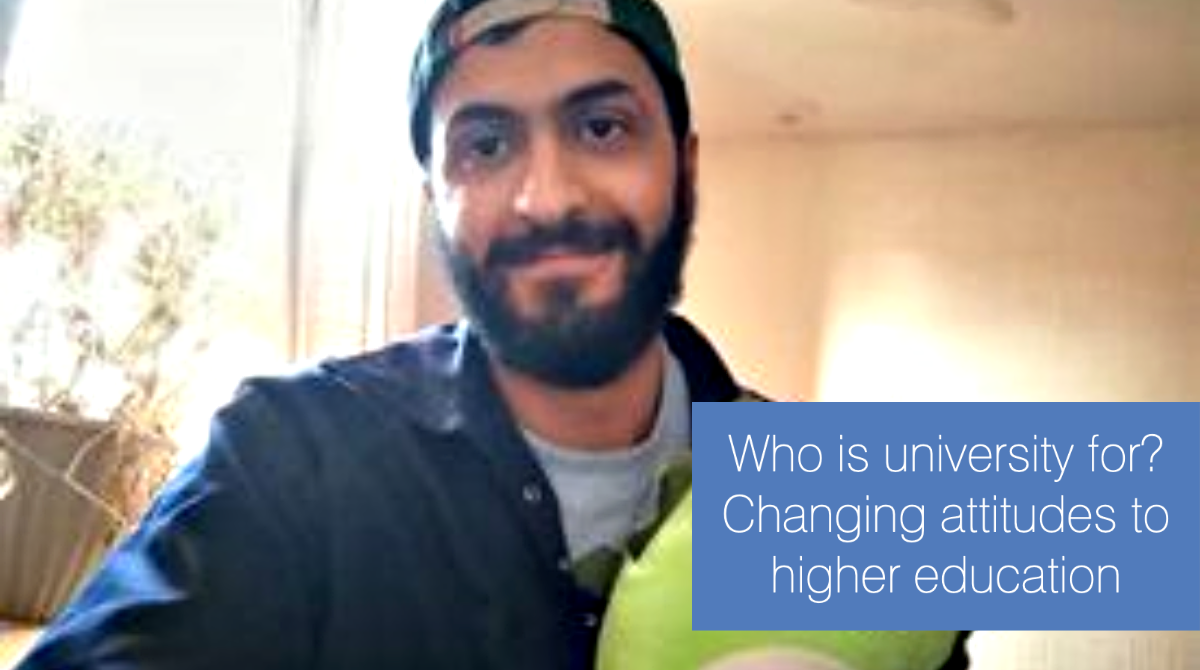Who is university for? Changing attitudes to higher education

Abd Al-Rahman Al-Remal is in his third year of studying Electrical and Mechanical Engineering. Growing up in one of Scotland’s most deprived areas, Abd’s journey to university wasn’t as straightforward as other students’ journeys might have been. Now he’s part of the University’s YourEd programme, promoting higher education to school pupils across South East Scotland.
On the face of it, applying to university is easy. Just draft your personal statement, get good grades in exams, have your guidance teacher write you a glowing reference and then get notifications from UCAS with all your offers. Or is it?
Widening participation puts a spotlight on the detail between those steps and emphasises that, for some, just applying to university can be an incredibly convoluted, laboursome and difficult process. I grew up in a town that had multiple areas ranked by the Scottish Index of Multiple Deprivation (SIMD) as some of the most deprived areas. But go less than a mile away, and they are considered some of the country’s least deprived areas. I’ve always believed that the difference in pupils’ attitudes towards higher education had more of a systemic cause.
Often, pupils may have additional care responsibilities at home or may have to work a part-time job in order to help support their household. Some Scottish teenagers, and sometimes even younger children, have more on their plate than the average university student – and yet it can go unnoticed by peers, school staff and society in general. It’s safe to say that those young adults have to prioritise a lot over their studies, and are therefore at a huge disadvantage compared to their peers.
Therefore, Widening Participation (WP) doesn’t put anybody at an “advantage”, in fact, it actually helps in levelling the playing field, and the misconception that WP students are offered a place purely to meet certain quotas is a myth. It can be hard to fully understand the reason as to why some students don’t perform as well, however, it simply being because they didn’t work hard enough is untrue.
Even with the introduction of widening access offers and clearing sometimes being reserved for pupils that are deemed to be from WP backgrounds, many don’t even apply to university. This is where the YourEd project comes in. YourEd focuses on promoting higher education, and the idea that there’s no “typical” student.
YourEd isn’t simply placing pupils from deprived areas into university, because it may not be the right path for them. However, it’s giving them a real chance to see, experience and understand what university is like – which is ultimately what every pupil deserves.
YourEd works with partner schools across South East Scotland and targets all stages throughout high school, with the main focus on pupils in more senior stages, as this is when pupils begin to think most about their life after school. The YourEd project prepares pre-recorded sessions with YourEd former pupils, who are current university students such as myself, on various topics about university life. These span from making friends, managing finances, the stages of the UCAS application, and many more.
We also run live Q&A sessions with pupils, and the new YourEd mentoring scheme has just been launched. This pairs pupils in their final year of high school with current students at the university, so that any questions those pupils may have can simply be emailed across and answered. More importantly, it gives a more relaxed and personal feel to any of the advice and services we can provide and makes it more easily digestible.
Pupils from my old school recently attended a YourEd event and this made reflecting on my previous misconceptions about university so much easier – and enabled me to see the effect that YourEd has made since I left school. School pupils asking questions that students might perceive as obvious is a huge win, as it will help in them truly consider applying to university.
I was fortunate however to have teachers who would answer questions I have about applying to university and the lifestyle as a student. One of my teachers in particular gave me insight into what commuting by train to university would be like and what they struggled with – in addition to Scotrail’s reliable timing. However, I know that my positive experience doesn’t apply to everyone, not even my peers from school, and as such efforts have to be undertaken to show pupils that going to university is an option for them after school.
Thanks to all the help I received and continue to receive from my family and friends, I’ve managed to have a great time at university. I’ve joined the Engineering Hockey team, which I love and worked on amazing projects with the Engineering For Change Society – including building a wind turbine, developing STEM projects for primary schools and much more. Additionally, working with YourEd has been great fun! The team is really supportive, helpful and has good banter all round. It’s also allowed me to reflect on how far I’ve come since school, how much I’ve learnt (and forgotten… apologies if my old science and modern studies teachers read this bit!) and what I’m now looking forward to after university.
YourEd isn’t simply placing pupils from deprived areas into university, because it may not be the right path for them. However, it’s giving them a real chance to see, experience and understand what university is like – which is ultimately what every pupil deserves.





Recent comments